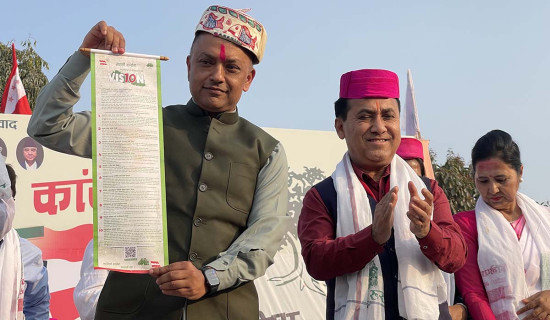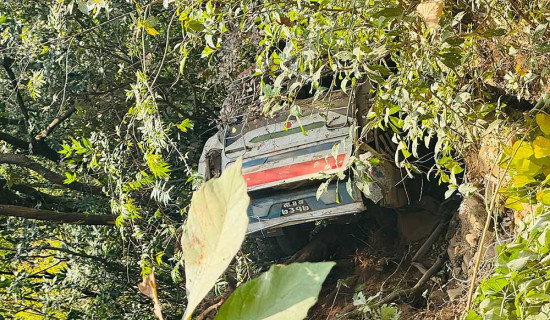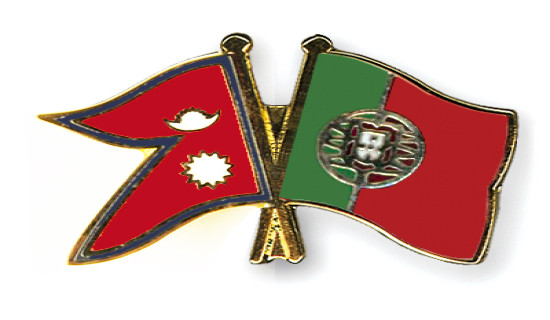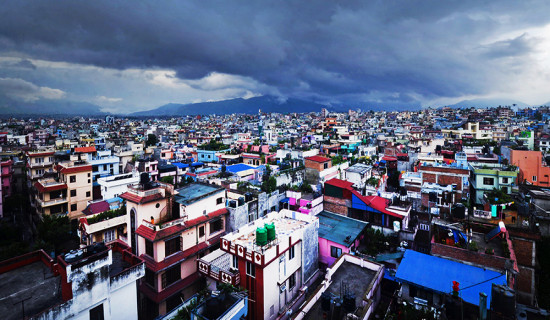- Thursday, 19 February 2026
Party Positions Vis-à-vis Manifestoes
Mukti Rijal
The nation is going to vote for new government both at the federal and provincial levels on coming Sunday. The ordinary voters as such appear not very much enthused and motivated to respond to the calling of the elections nor do they appear impressed by the promises and offers contained in the manifestoes issued by the political parties.
The commitment papers of the parties have been perceived as ritual tautologies and rhetoric expressions to which voters do care least or accord meaningful attention. However, both print and electronic media have discussed albeit superficially and made a critical analysis of the manifestoes articulating that parties repeat the same promises and offers each time when there is an election but neglect them after the polls are over.
Seldom do political parties demonstrate their commitments and seriousness to implement the promises enshrined in the manifestoes thereby reducing them into the scraps of papers having no any value and meaning from policy-making and implementation perspectives.
This article attempts to discuss the positions of the parties on the form of government – parliamentary and presidential – as spelt out in their manifestoes wondering if this will have any meaning and sense backed up by follow up advocacy and action in the post-poll political context.
As in the past, CPN-Maoist Centre has repeated its stance in favour of direct elected presidency and full proportional representational mode of elections. It has advocated similar pattern of government at the provincial level with direct elected governor and proportionally elected provincial legislature.
Poll environment
Rastriya Prajatantra Party (RPP) has also pitched in for direct elected prime minister and constitutional monarch as the head of the state. This stance has been the repeat of its earlier positions. This time RPP has strengthened its support base with Rabindra Mishra and Manisha Koirala extending their back up to the leadership of Rajendra Lingden. Upendra Yadav-led Janata Samajbadi Party (JSP) and Dr. Babu Ram Bhattarai-headed Nepal Samajbadi Party (NSP) have clearly articulated their position in favour of direct elected executive.
Another new party that has hit poll environment gathering momentum is the Nepal Swatantra Party led by Rabi Lamichhane which has also made its position clear in favour of direct elected executive prime minister with president elected by the national electoral college composed of local, provincial and federal legislatures.
Nepali Congress, CPN-UML, CPN-Unified Socialist and Loktantrik Samajbadi Party are all silent or in favour of retaining the existing parliamentary mode of government.
According to these parties, it is better to have patience and show steadiness to allow the existing governing and electoral system work for a longer period of time since direct elected presidency may slide into an authoritarian trap.
It needs no repeating the fact that the federal constitution promulgated in 2015 establishes parliamentary mode of governance with some innovation in the Westminster model characterised by constructive vote of no-confidence.
Moreover, this federal constitution adopts the mixed electoral system with an appropriate blend of the first-past-the-post and proportional representation. However, parliamentary form of government backed up by mixed electoral system has failed to ensure policy and governmental stability as evidenced by the dissolution of parliament and change in the guard of the government.
Political parties that favour presidential democracy argue that it has some meaning and significance especially in the context where political instability has been a recurring malaise. This vests in the directly elected president authority to choose the ministers at his or her own choice. As a result, the government would not have to depend on the vote of federal legislature to survive and efficient enough to deliver.
Moreover, the kind of foul bargaining and the allegedly horse trading practices that are involved in the making of the ministers and other high level official appointments will not occur in the direct elected presidency.
Like the president’s fixed term of office, the legislature, too, stays on for a fixed term of office and can never be dissolved or suspended before its tenure completes. Direct elections make the president’s powers more legitimate in comparison to the powers of a leader who is appointed indirectly in the parliamentary system.
Moreover, president is vested with strong powers that can regularly affect changes in a speedy manner as and when needed. In this way, practices have demonstrated that a presidential democracy can respond quickly to emerging situations.
Shortcomings
A president, using a predetermined term, is likely to offer more stable leadership. These predetermined elections become a welcome “check” on the executive’s powers. However, presidential democracy has several shortcomings as well. It has authoritarian bias and can cause authoritarianism and illiberal posturing to grow and seek to vindicate its role.
The president and the legislature have similar mandates from the public. This means that conflicts between the executive and the legislative arms of government might prove hard to reconcile.
It shows that the presidential democracy is not free from problems or constraints. Thus both parliamentary and presidential democracies have their own respective strengths and weaknesses. Nepali political stakeholders need to take cognizance of the fact that no one system is better than the other.
When we discuss to choose appropriate kind of model of democracy and government, it is important to weigh upon their pros and cons and take decisions accordingly. While it is important to choose appropriate model, it is equally important to note that the democratic institutions cannot work unless they are handled with high level of probity and sincerity.
Political parties are, therefore, advised to initiate follow up deliberations and dialogues on their stances on the form of government and mode of elections keeping their strengths and weaknesses into account. This will help clarify the rationale of their position and help build and mobilise opinion accordingly.
(The author is presently associated with Policy Research Institute (PRI) as a senior research fellow. rijalmukti@gmail.com)









-original-thumb.jpg)
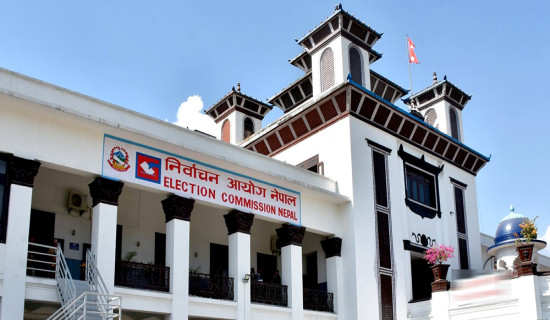
-original-thumb.jpg)

